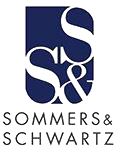Contact
WORK: (415) 955-0925
CELL: 415-308-4004
EMAIL: ffs@sommersschwartz.com
LINKEDIN: Frank F. Sommers
Practice Areas
Business Breakup
Copyright & Trade Secret Intellectual Property
Corporate Control/Partnership Dissolution
FINRA Securities Arbitrations - unsuitabilty
Internet Privacy, Defamation and First Amendment
Software and Systems Development Disputes
In addition to these areas of specialty, both partners work together on all significant cases.
Education
GEORGETOWN UNIVERSITY LAW CENTER
Juris Doctor, cum laude, 1982
DARTMOUTH COLLEGE
B.A., Government, minor in Russian Language, 1977
Activities & Affiliations
TRIAL PRACTICE INSTRUCTOR
Intensive Advocacy Program
University of San Francisco
Council for International Legal Studies Visiting Lecturer:
Tomsk State University
University of St. Petersburg
MEMBER
San Francisco Bar Association
California Bar Association
ASSOCIATE EDITOR
ABA Litigation Magazine, 2013-2015
FOUNDER & PAST PRESIDENT
San Francisco Lawyers Club Inn of Court
Bar Admissions
California, 1982
U.S. District Court for the Northern, Central and Southern Districts of California, 1982
Publications
Thermostats That Testify—Who Knew?
Litigation, Vol. 41, No. 3, 2015
Securing Your Data in a World of Remote Access
Litigation, Vol. 40, No. 3, 2014
The Electric Kool-Aid Judgment Test Making Your Papers Come Alive
Litigation, Vol. 40, No 1, 2013
Co-author with Rob Bunzel
Winning Your Case Using Visual Grammar
Litigation, Vol. 40, No. 1, 2013
Co-author with Dan Roam
Representing the Anonymous Client
Litigation, Vol. 39, No. 3, 2013
Experience
Mr. Sommers is an IBM systems engineer turned trial lawyer who grew up in Europe and who speaks four languages. He has spent the last thirty years applying his computer training and international experience to trying complex business cases in federal and state courts. These include intellectual property, software and computer system development contracts, whistle-blower, business breakup and, Internet defamation and privacy cases.
His computer background informs his legal practice, both substantively and in connection with the multiple software systems needed to collect, store, analyze and present at trial the huge volume of electronic evidence that a modern case generates. His international experience allows him to handle both international dispute tribunals and to appreciate cross-cultural and cross linguistic differences that are often required to understand why a given witness or party has acted as they did.
Mr. Sommers and his partner Andrew Schwartz have the trial experience to face down an opponent who believes that he or she can browbeat you into settling because something is too complicated or too expensive to try. Yes, trial is ruinously expensive. Yes, cases should settle if both parties are even partially reasonable. However, sometimes your opponent’s knowing that you are represented by counsel who is happy to try the case makes the difference between concluding a matter advantageously or being forced to fold your hand and walk away.
Similarly, Mr. Sommers specializes in knowing what parts of the case should be presented to the court and jury first- how to "split the stone" into the pieces that best suit your case, not your opponents'. This is not mysticism, but an understanding of how the hard facts of the law and the art of its presentation come together in a successful case.
There are two phases of any lawsuit-the first phase in which facts are gathered and legal arguments are presented to the court by one side or the other with an intent to block a given result. When the trial approaches, however, the matter must be reconsidered from the viewpoint of equity, fairness-does the result we are asking for pass the “fairness sniff test"?
Lawyers who do not try cases frequently fail to appreciate the point at which this change occurs - When it is no longer enough to argue the arcana of the law, but when judge and jury, and especially the latter, must be shown that your desired result is the fair one, not merely the legal one.
Mr. Sommers believes that you, the client, need lawyers who try cases and who can therefore balance both elements. If they don't know the law, your case won’t survive to trial. But if your counsel keep arguing only the law to the jury, the jury won't care enough about you to want to rule in your favor.

